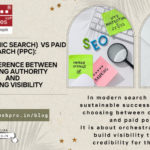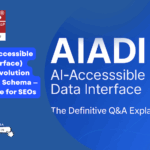For over two decades, search engines have defined how we access information online. Whether you were Googling a product, a how-to guide, or a definition, the search query was your digital key to the web. But with the rise of generative AI models like OpenAI’s ChatGPT, Anthropic’s Claude, Google’s Gemini, and emerging hybrid search-AI platforms like Perplexity, something fundamental is changing.
Search queries are evolving — and in many contexts, they’re being replaced.
Welcome to the age of AI prompts.
From Search Queries to Prompts: A Paradigm Shift
At first glance, prompts and search queries seem nearly identical. You type a question or a phrase, hit "Enter," and get results. But dig deeper, and the difference is more than semantics — it’s systemic.
What is a Search Query?
A traditional search query is a short, often keyword-rich string typed into a search engine. It aims to retrieve a ranked list of relevant web pages. Search engines index the web, match terms to documents, and surface links based on relevance, quality, and authority.
What is an AI Prompt?
An AI prompt is a command or question given to a large language model. Instead of returning a list of links, it generates a direct, synthesized, and often conversational response — complete with context, summaries, or creative output. It doesn’t just find — it creates and adapts.
AI Prompts vs. Search Queries: A Side-by-Side Comparison
| Feature | Traditional Search Query | AI Prompt |
| Goal | Retrieve links to documents | Get a direct, contextually rich response |
| Response | List of ranked search results | Natural language output or task completion |
| Input Style | Keywords or short phrases | Full sentences or commands |
| Interactivity | One-off interaction | Ongoing, conversational experience |
| Customization | Limited (filters, operators) | High (tone, format, length, persona) |
| Source Transparency | Links to real web pages | Sources may or may not be cited |
| Adaptability | Generalized answers | Hyper-personalized responses |
Here's how they're similar:
- Input-driven: Like search queries, prompts are short pieces of text people type in to get answers or content.
- Goal-oriented: Both are used to solve problems, answer questions, or find information.
- Used daily: Just like people "Google" things, they're now increasingly "prompting" AI to get answers, generate content, or help with tasks.
Why This Matters for Search Professionals and Marketers
This shift challenges some of the foundational assumptions behind SEO and search behavior.
- Fewer clicks: AI answers often replace the need to visit a website.
- Zero-click behavior accelerates: If ChatGPT can generate a recipe, essay, or product comparison, why go to a website at all?
- Structured data and optimization must evolve: Instead of optimizing for keyword queries alone, content creators may need to think in terms of promptability — how well can your content feed an LLM?
Real-Life Examples: From Query to Prompt
Let’s look at how classic search queries transform when reframed as prompts.
- Learning a Concept
Search Query: how does blockchain work
AI Prompt: "Explain blockchain in simple terms using a supply chain example. Include real-world use cases."
AI prompt adds clarity, audience context, and desired tone.
- Professional Writing Help
Search Query: cover letter for marketing job
AI Prompt: "Write a cover letter for a mid-level marketing role emphasizing skills in digital strategy and analytics. Keep it to 300 words."
You don’t just get templates — you get results tailored to your background and job title.
- Summarizing Content
Search Query: summary of To Kill a Mockingbird
AI Prompt: "Summarize 'To Kill a Mockingbird' in 5 bullet points for a high school student, focusing on main themes and character arcs."
The AI adapts to audience level, tone, and structure.
- Task Completion
Search Query: how to make pasta with tomatoes and spinach
AI Prompt: "Give me a quick vegetarian pasta recipe using only tomatoes, garlic, olive oil, and spinach. Prep time under 20 minutes."
The AI goes beyond finding — it delivers a ready-to-use solution.
Why Users Are Prompting More and Searching Less
There are four main reasons AI prompting is gaining traction:
- Speed and Efficiency
AI gives answers, not just options. No need to sift through 10 blue links.
- Conversation and Clarification
With search, your query ends with a result. With AI, you can refine your question in real time — like a tutor, not a static index.
- Customization
Search is general. AI prompts are personal. You can tell the AI your background, your goals, and even your mood.
- Creativity and Execution
Want a haiku about your brand? A legal disclaimer? A meta description? Prompts turn intent into content directly.
Will Search Engines Die? Not Quite.
Search isn't disappearing. It’s evolving — and in many ways, merging with AI. Google’s AI Overviews, and tools like Perplexity.ai are hybrids — combining traditional search infrastructure with generative AI responses.
These platforms blur the line between link-based search and prompt-driven interaction.
What’s clear is this: the interface between users and information is changing. Instead of keywords, we now use full thoughts. Instead of hunting, we prompt.
The Future: Prompt Optimization as the New SEO?
Just as SEO pros once focused on keyword density, headings, and backlinks, a future discipline may emerge around prompt optimization.
- How do you write content that feeds well into LLMs?
- How do you structure knowledge so it’s “AI-readable”?
- What does attribution and traffic look like in an AI-dominated SERP?
Tools like Schema.org, content snippets, and high-quality structured data will still play a role — but we may also see new formats designed specifically for LLM digestion.
So, Are AI Prompts the New Search Queries?
Yes — and no.
Prompts are not a replacement for search queries. They’re an evolution — a more conversational, capable, and task-oriented way to access information. Just like the shift from directories to search engines in the early 2000s, or from desktops to mobile in the 2010s, the way we find and use information is transforming again.
For digital marketers, SEOs, and content creators, this shift means one thing: adapt or fall behind.
Understanding how people use prompts, and how AI understands content, will be crucial for anyone hoping to remain relevant in the new search landscape.
Key Takeaways
- AI prompts are becoming a dominant way people access information.
- They are more interactive, specific, and generative than traditional search queries.
- SEO will not die but must evolve toward prompt-aware content strategies.
- Search engines are becoming AI-powered interfaces, merging links with synthesis.
- Understanding intent, tone, and format in prompts will be key to visibility and engagement.
Point to Ponder
Search used to be about what people typed. Now, it’s about what they ask.
And in the world of AI, the better the question — the better the answer.
June 4, 2025







